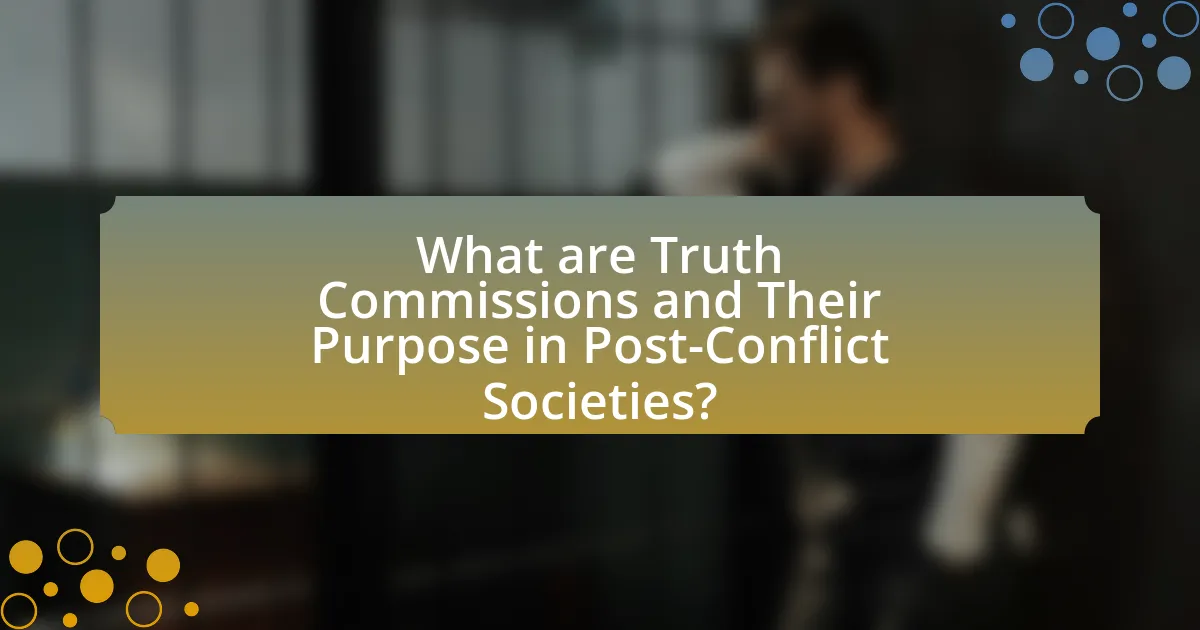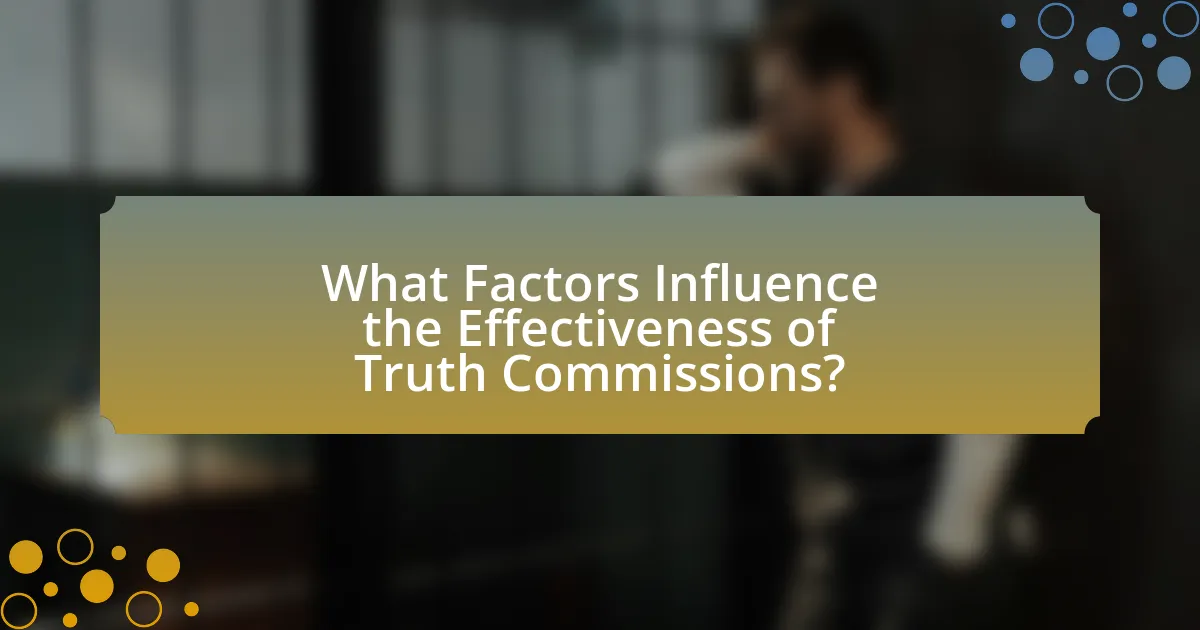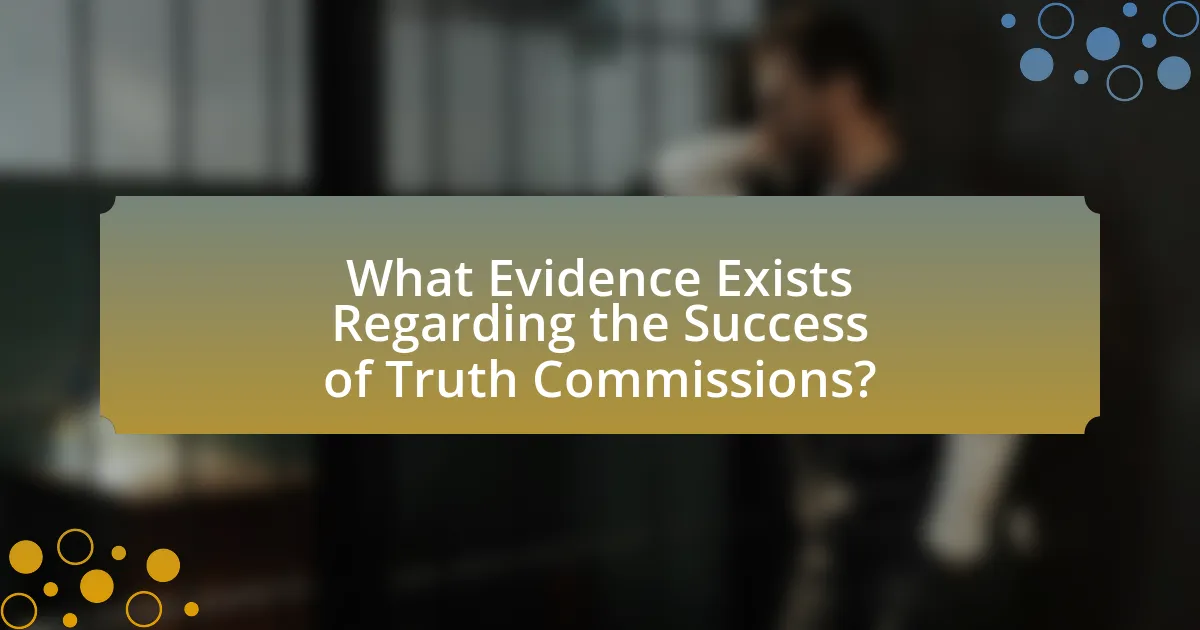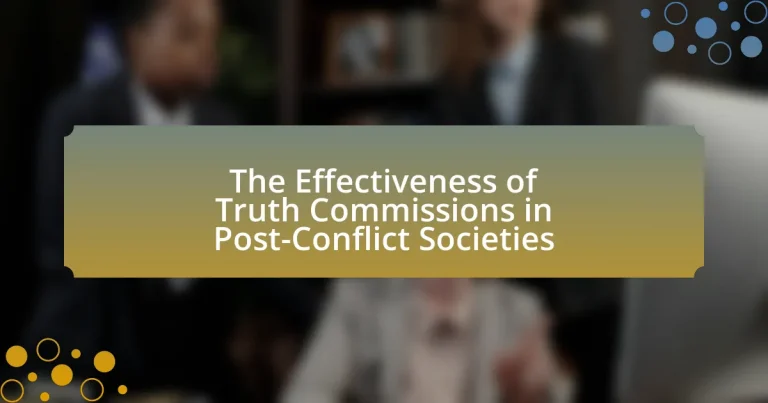Truth commissions are official bodies established to investigate and document human rights violations in post-conflict societies, aiming to promote reconciliation, establish a historical record, and provide a platform for victims to share their experiences. This article examines the purpose, functioning, and key objectives of truth commissions, highlighting their role in fostering accountability and healing. It also explores the factors influencing their effectiveness, including political will, public support, and societal attitudes towards justice, while addressing the challenges they face in gathering testimonies and ensuring transparency. Case studies, such as the South African and Guatemalan truth commissions, illustrate their impact on national healing and the importance of community involvement in enhancing outcomes.

What are Truth Commissions and Their Purpose in Post-Conflict Societies?
Truth commissions are official bodies established to investigate and document human rights violations and atrocities that occurred during periods of conflict or authoritarian rule. Their primary purpose in post-conflict societies is to promote reconciliation, establish a historical record, and provide a platform for victims to share their experiences, thereby fostering healing and preventing future violence. For instance, the South African Truth and Reconciliation Commission, established in 1995, aimed to address the injustices of apartheid by uncovering the truth about past abuses, which helped to facilitate a peaceful transition to democracy.
How do Truth Commissions function in the context of post-conflict societies?
Truth Commissions function in post-conflict societies by investigating and documenting human rights violations that occurred during periods of conflict, aiming to promote reconciliation and healing. These commissions gather testimonies from victims and perpetrators, analyze evidence, and produce reports that outline the findings, often recommending measures for reparations and institutional reforms. For example, the South African Truth and Reconciliation Commission, established in 1995, played a crucial role in addressing the atrocities of apartheid by facilitating public hearings and fostering dialogue, which contributed to the nation’s transition to democracy. Such mechanisms are essential for acknowledging past injustices, fostering accountability, and rebuilding trust within communities.
What are the key objectives of Truth Commissions?
The key objectives of Truth Commissions are to uncover the truth about past human rights violations, promote accountability, and foster reconciliation in post-conflict societies. Truth Commissions aim to document and acknowledge the experiences of victims, providing a platform for their voices and narratives. They also seek to identify perpetrators and recommend measures to prevent future abuses, thereby contributing to the rule of law and strengthening democratic governance. Historical examples, such as the South African Truth and Reconciliation Commission, illustrate how these objectives can facilitate healing and social cohesion in societies recovering from conflict.
How do Truth Commissions differ from other transitional justice mechanisms?
Truth Commissions differ from other transitional justice mechanisms primarily in their focus on uncovering the truth about past human rights violations rather than administering punishment or reparations. Unlike courts, which emphasize legal accountability through trials and sentencing, Truth Commissions prioritize documentation, acknowledgment, and reconciliation by collecting testimonies from victims and perpetrators. For instance, the South African Truth and Reconciliation Commission, established in 1995, aimed to foster national unity and healing by revealing the atrocities of apartheid, contrasting with judicial processes that might have led to imprisonment without addressing broader societal healing. This unique approach allows Truth Commissions to facilitate dialogue and promote understanding, which is often absent in punitive mechanisms.
What role do Truth Commissions play in reconciliation processes?
Truth Commissions play a crucial role in reconciliation processes by facilitating dialogue, uncovering the truth about past human rights violations, and promoting accountability. These commissions gather testimonies from victims and perpetrators, which helps to document abuses and acknowledge the suffering of affected communities. For instance, the South African Truth and Reconciliation Commission, established in 1995, aimed to address the atrocities of apartheid and foster national healing by allowing victims to share their experiences publicly. This process not only validated the victims’ experiences but also encouraged societal reflection and understanding, which are essential for rebuilding trust in post-conflict societies.
How do Truth Commissions contribute to national healing?
Truth Commissions contribute to national healing by facilitating dialogue, acknowledging past injustices, and promoting reconciliation among affected communities. These commissions provide a platform for victims to share their experiences, which helps validate their suffering and fosters a collective understanding of the past. For instance, the South African Truth and Reconciliation Commission, established in 1995, allowed victims of apartheid to testify, leading to public acknowledgment of human rights violations and fostering a sense of closure. Additionally, by documenting historical events and promoting accountability, Truth Commissions can help prevent future conflicts, as seen in countries like Guatemala, where the commission’s findings led to legal actions against perpetrators. This process of truth-telling and acknowledgment is essential for rebuilding trust and social cohesion in post-conflict societies.
What impact do Truth Commissions have on victims and perpetrators?
Truth Commissions significantly impact both victims and perpetrators by facilitating acknowledgment, accountability, and healing. For victims, these commissions provide a platform for their experiences to be heard, which can lead to emotional relief and validation, as evidenced by the South African Truth and Reconciliation Commission, where many victims reported a sense of closure after sharing their stories. For perpetrators, Truth Commissions often encourage confessions and admissions of guilt, which can mitigate legal repercussions and promote societal reintegration, as seen in the case of the Chilean Truth Commission, where many former officials participated in the process to seek forgiveness and restore their reputations. Overall, Truth Commissions play a crucial role in fostering reconciliation and rebuilding trust in post-conflict societies.

What Factors Influence the Effectiveness of Truth Commissions?
The effectiveness of truth commissions is influenced by several key factors, including political will, public support, the commission’s mandate, and the involvement of civil society. Political will is crucial, as it determines the extent to which government officials are willing to cooperate with the commission and implement its recommendations; for instance, in South Africa, the political commitment from the post-apartheid government significantly bolstered the commission’s impact. Public support enhances the legitimacy of the commission, encouraging broader participation and acceptance of its findings; in countries like Guatemala, widespread public engagement helped to validate the commission’s work. The clarity and scope of the commission’s mandate dictate its operational effectiveness; a well-defined mandate, as seen in the Sierra Leone Truth and Reconciliation Commission, allows for focused investigations and recommendations. Lastly, the active involvement of civil society organizations can provide essential resources and advocacy, as demonstrated in the case of the Chilean National Commission on Truth and Reconciliation, where NGOs played a vital role in gathering testimonies and promoting the commission’s findings.
How does the political context affect Truth Commission outcomes?
The political context significantly influences Truth Commission outcomes by shaping the commission’s mandate, public perception, and the willingness of stakeholders to cooperate. In environments where political stability is tenuous, commissions may face pressure from powerful political actors, leading to limited access to information and reduced accountability for perpetrators. For instance, in South Africa, the Truth and Reconciliation Commission operated within a negotiated political settlement, which allowed for a degree of openness but also constrained its ability to pursue justice against high-ranking officials. Conversely, in countries with strong political will for reform, such as Sierra Leone, Truth Commissions can achieve more comprehensive investigations and foster societal healing, as evidenced by the public’s engagement and support for the commission’s findings. Thus, the political landscape directly affects the effectiveness and credibility of Truth Commissions in addressing past atrocities.
What role does government support play in the success of Truth Commissions?
Government support is crucial for the success of Truth Commissions, as it provides the necessary legitimacy, resources, and political backing to facilitate their operations. When a government actively endorses a Truth Commission, it enhances public trust and encourages participation from victims and witnesses, which is essential for gathering comprehensive testimonies. For instance, the South African Truth and Reconciliation Commission, established in 1995, received significant government backing, which allowed it to operate effectively and gain widespread acceptance among the populace. Conversely, lack of government support can lead to limited funding, political interference, and a lack of enforcement power, undermining the commission’s ability to fulfill its mandate. Therefore, government support directly influences the operational capacity and overall effectiveness of Truth Commissions in achieving their goals of accountability and reconciliation in post-conflict societies.
How do societal attitudes towards justice impact Truth Commission effectiveness?
Societal attitudes towards justice significantly impact the effectiveness of Truth Commissions by influencing public trust and participation. When a society values accountability and transparency, Truth Commissions are more likely to receive cooperation from victims and perpetrators, leading to comprehensive investigations and more accurate historical records. For instance, in South Africa, widespread societal support for justice and reconciliation facilitated the Truth and Reconciliation Commission’s ability to uncover the truth about apartheid-era atrocities, resulting in over 7,000 statements from victims. Conversely, in societies where there is skepticism about justice or a preference for impunity, Truth Commissions may struggle to gain legitimacy and may be met with resistance, limiting their ability to fulfill their mandate effectively.
What are the challenges faced by Truth Commissions?
Truth Commissions face several challenges that hinder their effectiveness in post-conflict societies. One significant challenge is the lack of political will from government authorities, which can lead to insufficient support and resources for the commission’s work. For instance, in countries like South Africa, the Truth and Reconciliation Commission struggled with political resistance that limited its ability to hold powerful individuals accountable.
Another challenge is the difficulty in gathering credible testimonies, as victims may fear retribution or lack trust in the process. In Guatemala, the Historical Clarification Commission faced obstacles in obtaining reliable information due to the ongoing fear among survivors of violence.
Additionally, societal divisions and a lack of consensus on historical narratives can impede the commission’s ability to foster reconciliation. In countries like Rwanda, differing perspectives on the genocide complicate the commission’s efforts to create a unified understanding of events.
Finally, the limited scope of some Truth Commissions, which may not address all human rights violations or exclude certain groups, can lead to feelings of exclusion and resentment among affected populations. For example, the El Salvador Truth Commission was criticized for not fully addressing the experiences of marginalized communities, which undermined its legitimacy.
How do issues of funding and resources affect Truth Commission operations?
Issues of funding and resources significantly hinder Truth Commission operations by limiting their capacity to conduct thorough investigations and outreach. Insufficient financial support can lead to inadequate staffing, reduced public engagement, and restricted access to necessary documentation and witnesses. For instance, the South African Truth and Reconciliation Commission faced challenges due to budget constraints, which affected its ability to fulfill its mandate effectively. Additionally, a study by the International Center for Transitional Justice highlights that lack of resources often results in delayed processes and incomplete reports, undermining the overall credibility and impact of the commission’s findings.
What obstacles do Truth Commissions encounter in gathering testimonies?
Truth Commissions encounter several obstacles in gathering testimonies, including fear of reprisal, lack of trust in the process, and cultural stigmas surrounding disclosure. Fear of reprisal often deters individuals from coming forward, especially in societies where perpetrators of violence may still hold power or influence. Lack of trust in the commission’s ability to protect witnesses or deliver justice can further inhibit participation, as seen in various case studies where victims expressed skepticism about the outcomes. Additionally, cultural stigmas related to discussing trauma or shame can prevent individuals from sharing their experiences, as evidenced in contexts where societal norms discourage open dialogue about past atrocities. These factors collectively hinder the effectiveness of Truth Commissions in fulfilling their mandate to gather comprehensive and truthful accounts of past events.

What Evidence Exists Regarding the Success of Truth Commissions?
Evidence regarding the success of truth commissions indicates that they can significantly contribute to reconciliation and societal healing in post-conflict societies. For instance, the South African Truth and Reconciliation Commission (TRC) is often cited as a successful model, as it facilitated over 7,000 statements from victims and perpetrators, promoting public acknowledgment of human rights violations. Research by the International Center for Transitional Justice shows that truth commissions can enhance public trust in institutions, with 70% of South Africans believing the TRC contributed to national unity. Additionally, a study published in the Journal of Peace Research found that countries with truth commissions are less likely to experience a resurgence of violence compared to those without, highlighting their role in fostering long-term peace.
How can we measure the effectiveness of Truth Commissions?
The effectiveness of Truth Commissions can be measured through various indicators such as public trust in institutions, the extent of reconciliation among conflicting parties, and the degree of accountability achieved for past human rights violations. Research indicates that successful Truth Commissions often lead to increased public trust; for example, the South African Truth and Reconciliation Commission reported a significant rise in trust towards governmental institutions post-1994. Additionally, surveys conducted in countries like Guatemala and Sierra Leone show that Truth Commissions contribute to social cohesion and healing by facilitating dialogue and acknowledgment of past atrocities. Furthermore, the implementation of recommendations made by Truth Commissions, such as legal reforms and reparations, serves as a concrete measure of their effectiveness in promoting justice and preventing future violations.
What indicators are used to assess the success of Truth Commissions?
Indicators used to assess the success of Truth Commissions include public acceptance, the extent of truth-telling, accountability measures, and societal reconciliation. Public acceptance is measured by the level of trust and support from the community, often gauged through surveys and public opinion polls. The extent of truth-telling is evaluated by the volume and quality of testimonies collected, which reflects the commission’s ability to uncover historical facts. Accountability measures are assessed by the prosecution of perpetrators and the implementation of recommendations made by the commission, indicating a commitment to justice. Societal reconciliation is measured through indicators such as reduced violence, improved inter-group relations, and the establishment of memorials or educational programs that promote understanding of past atrocities. These indicators collectively provide a framework for evaluating the overall impact and effectiveness of Truth Commissions in fostering healing and preventing future conflicts.
How do post-commission evaluations contribute to understanding their impact?
Post-commission evaluations contribute to understanding their impact by systematically assessing the outcomes and effectiveness of truth commissions in achieving their objectives. These evaluations analyze various dimensions, such as the extent to which commissions fulfill their mandates, promote reconciliation, and provide justice for victims. For instance, a study by the International Center for Transitional Justice found that evaluations of truth commissions in countries like South Africa and Sierra Leone revealed significant insights into how public acknowledgment of past atrocities can foster societal healing and prevent future conflicts. By documenting successes and shortcomings, post-commission evaluations inform policymakers and stakeholders about best practices and areas needing improvement, thereby enhancing the overall effectiveness of future truth commissions.
What case studies illustrate the effectiveness of Truth Commissions?
Case studies that illustrate the effectiveness of Truth Commissions include the South African Truth and Reconciliation Commission (TRC) and the Chilean National Commission on Truth and Reconciliation. The South African TRC, established in 1995, successfully facilitated dialogue between victims and perpetrators of apartheid-era violence, leading to national healing and the establishment of a historical record, as evidenced by its comprehensive report detailing over 21,000 human rights violations. Similarly, the Chilean Commission, formed in 1990, documented human rights abuses during the Pinochet regime, contributing to societal acknowledgment of past atrocities and influencing legal reforms, as reflected in its report that identified 2,279 victims of enforced disappearance and execution. These case studies demonstrate how Truth Commissions can promote reconciliation, accountability, and historical documentation in post-conflict societies.
What lessons can be learned from the South African Truth and Reconciliation Commission?
The South African Truth and Reconciliation Commission (TRC) teaches several key lessons about reconciliation in post-conflict societies. Firstly, the TRC demonstrates the importance of acknowledging past atrocities to foster healing; it provided a platform for victims to share their experiences, which is crucial for collective memory and societal healing. Secondly, the TRC illustrates that truth-telling can promote accountability; by uncovering the truth about human rights violations, it encouraged a culture of transparency and justice. Additionally, the TRC highlights the necessity of inclusivity in the reconciliation process; it engaged diverse communities, ensuring that multiple perspectives were represented, which is vital for building trust among different societal groups. Lastly, the TRC shows that reconciliation is a long-term process requiring sustained commitment from both the government and civil society to address ongoing inequalities and grievances. These lessons underscore the TRC’s role in shaping effective reconciliation strategies in post-conflict contexts.
How did the Truth Commission in Guatemala address historical injustices?
The Truth Commission in Guatemala addressed historical injustices by documenting human rights violations that occurred during the civil war from 1960 to 1996. The commission’s final report, published in 1999, identified over 200,000 victims of violence, with the majority being civilians, and attributed 93% of the violations to state forces. This comprehensive documentation served to acknowledge the suffering of victims and their families, providing a historical record that challenged the narratives of denial and impunity. The commission also made recommendations for reparations and institutional reforms aimed at preventing future abuses, thereby contributing to a broader understanding of accountability and justice in post-conflict society.
What best practices can enhance the effectiveness of Truth Commissions?
Best practices that can enhance the effectiveness of Truth Commissions include ensuring broad public participation, maintaining independence from political influence, and providing adequate resources for operations. Broad public participation fosters trust and legitimacy, as seen in South Africa’s Truth and Reconciliation Commission, which engaged diverse communities and stakeholders. Independence from political influence is crucial; for instance, the Peruvian Truth and Reconciliation Commission operated with autonomy, allowing for impartial investigations. Adequate resources, both financial and human, are essential for thorough investigations and outreach, as demonstrated by the successful operations of the Sierra Leone Truth and Reconciliation Commission, which had sufficient funding to support its initiatives.
How can community involvement improve Truth Commission outcomes?
Community involvement can significantly improve Truth Commission outcomes by enhancing legitimacy, fostering trust, and ensuring comprehensive representation of diverse perspectives. When communities actively participate, they contribute local knowledge and experiences that enrich the commission’s understanding of the context and issues at hand. For instance, the South African Truth and Reconciliation Commission benefited from community engagement, which helped to uncover a broader range of human rights violations and facilitated healing processes. This involvement not only validates the commission’s findings but also encourages public acceptance and adherence to its recommendations, ultimately leading to more effective reconciliation and restorative justice in post-conflict societies.
What strategies can be implemented to ensure transparency and accountability?
To ensure transparency and accountability in post-conflict societies, implementing independent oversight bodies is essential. These bodies can monitor the activities of truth commissions, ensuring that their processes are open and accessible to the public. For instance, the South African Truth and Reconciliation Commission utilized independent observers to enhance credibility and public trust. Additionally, establishing clear reporting mechanisms allows citizens to voice concerns and provide feedback, fostering a culture of accountability. Research indicates that transparency in these processes can lead to greater public support and legitimacy, as seen in the experiences of truth commissions in countries like Sierra Leone and Guatemala.


